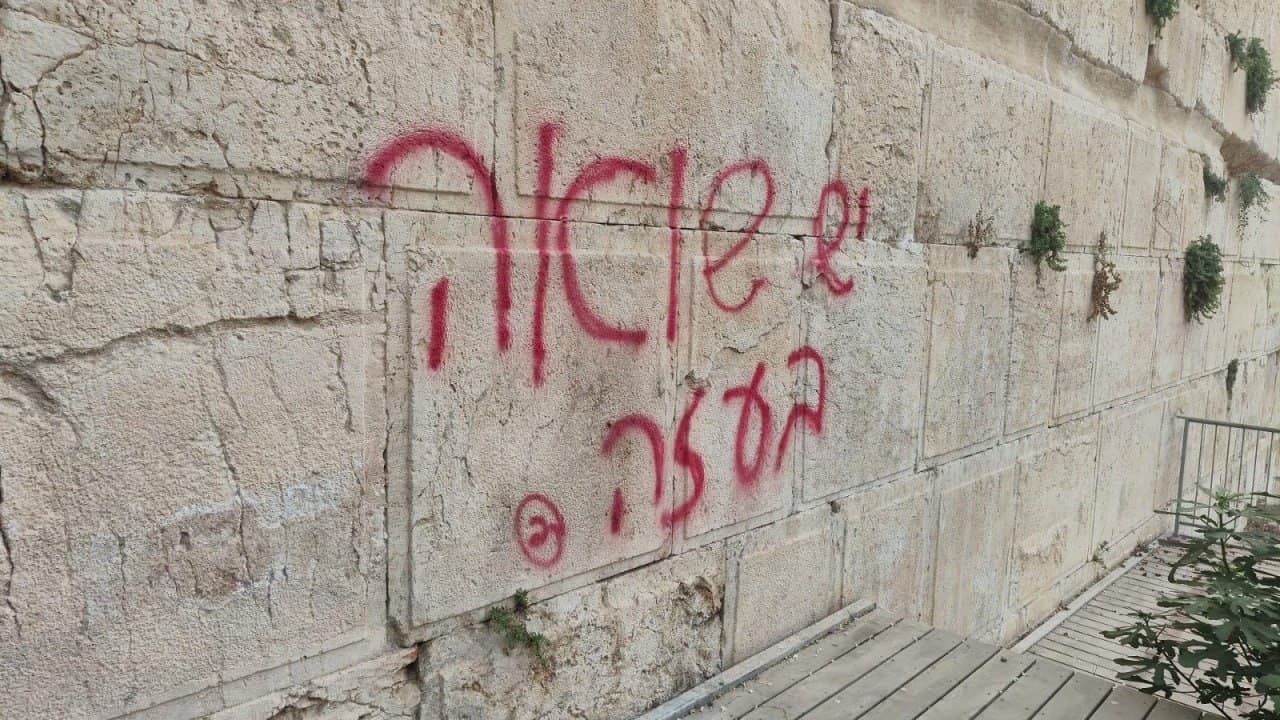Western Wall Defaced with Anti-War Graffiti, Igniting Outrage Amid Gaza Conflict
The Western Wall in Jerusalem was vandalised on Monday with graffiti denouncing Israel’s ongoing military actions in Gaza, an act that has incited widespread condemnation from religious leaders and politicians alike. The phrase “There is a holocaust in Gaza” was inscribed in Hebrew on the southern section of the wall, which is regarded as the holiest site for Jewish prayer. This incident has raised significant concerns regarding the ongoing tensions surrounding the Gaza conflict and the implications for interfaith relations in Israel.
Background & Context
The Western Wall, known as the Kotel, is a remnant of the Second Temple and holds immense historical and spiritual significance for Jews worldwide. Located in the Israeli-annexed Old City of Jerusalem, it serves as a focal point for prayer and pilgrimage. The recent graffiti incident reflects the heightened tensions surrounding the Gaza conflict, which has seen escalating violence and humanitarian crises over the past months. As previously reported, the situation in Gaza has drawn international scrutiny, with calls for ceasefires and peace negotiations.
This act of vandalism is not isolated; similar anti-war messages were also found scrawled on the walls of the Great Synagogue in Jerusalem, suggesting a broader sentiment among certain groups in Israel who oppose the military actions in Gaza. The graffiti at such a significant religious site underscores the deep divisions and intense emotions surrounding the conflict, which has claimed thousands of lives and displaced many more.
Key Developments
Following the discovery of the graffiti, prominent religious figures and political leaders expressed outrage. Rabbi Shmuel Rabinowitz, the rabbi of the Western Wall and holy sites, condemned the act as an affront to Jewish values and the sanctity of the site. In his statement, he emphasized that the message of hate and division has no place in a sacred space dedicated to prayer and reflection.
Politicians across the spectrum also weighed in, with many calling for a united front against such vandalism. The Israeli government has launched an investigation into the incident, seeking to identify those responsible for defacing the wall. The act has sparked debates about freedom of expression versus the respect for religious sites, a contentious issue in a region marked by conflict and differing narratives.
Broader Impact
The defacement of the Western Wall serves as a stark reminder of the ongoing strife in the region and the polarizing views surrounding the Gaza conflict. Experts suggest that acts of vandalism like this can exacerbate tensions between different communities and complicate efforts towards peace. For many, the graffiti represents not only a condemnation of military actions but also a call for greater awareness of the humanitarian crisis unfolding in Gaza.
Historically, the Western Wall has been a symbol of resilience and faith for the Jewish people, but its recent defacement reflects the painful reality that religious spaces can also become battlegrounds for political expression. The incident has reignited discussions about the role of religious leaders in advocating for peace and reconciliation, particularly in light of the ongoing violence.
What"s Next
As investigations into the vandalism continue, there are growing calls for dialogue among communities in Israel, emphasizing the need for understanding and compassion amidst the conflict. The graffiti incident may serve as a catalyst for discussions on how to address the humanitarian needs in Gaza while also respecting the sanctity of religious sites.
In the coming weeks, faith leaders and community organizers are expected to convene to explore ways to foster interfaith dialogue and promote peace initiatives. Additionally, as the situation in Gaza evolves, international observers will likely continue to monitor the reactions within Israel, particularly as they relate to the broader implications for regional stability.
For those following recent developments in the region, it is crucial to remain informed about the ongoing discussions surrounding the Gaza conflict and its impact on local communities. This incident may be a pivotal moment that encourages a more unified approach to addressing the challenges faced by both Israelis and Palestinians.




![[Video] Pope Leo XIV condemns anti-Christian violence in Nigeria, Bangladesh, and Damascus](/_next/image?url=%2Fapi%2Fimage%2Fthumbnails%2Fthumbnail-1768006244320-mmtpte-thumbnail.jpg&w=3840&q=75)


![[Video] Gunfire between Iraqi security forces and Sadr militias in Baghdad](/_next/image?url=%2Fapi%2Fimage%2Fthumbnails%2Fthumbnail-1768343508874-4redb-thumbnail.jpg&w=3840&q=75)
